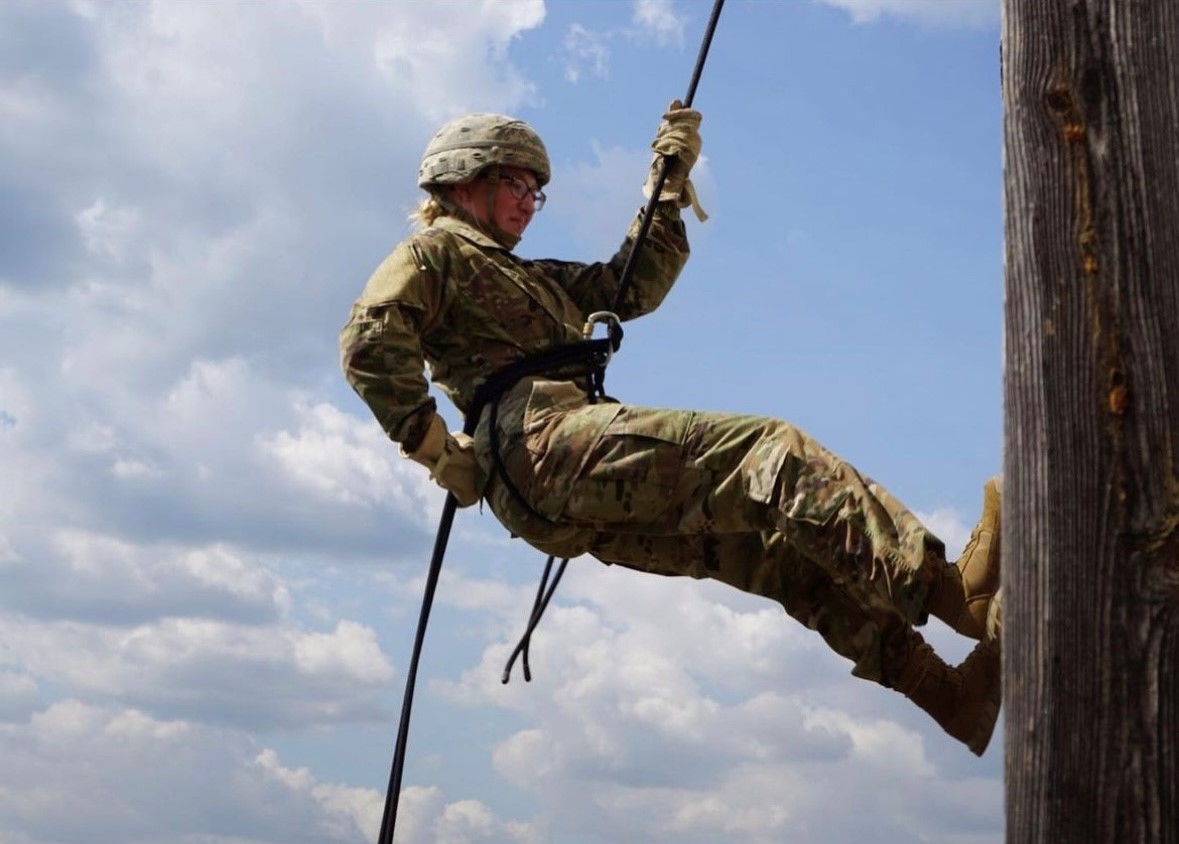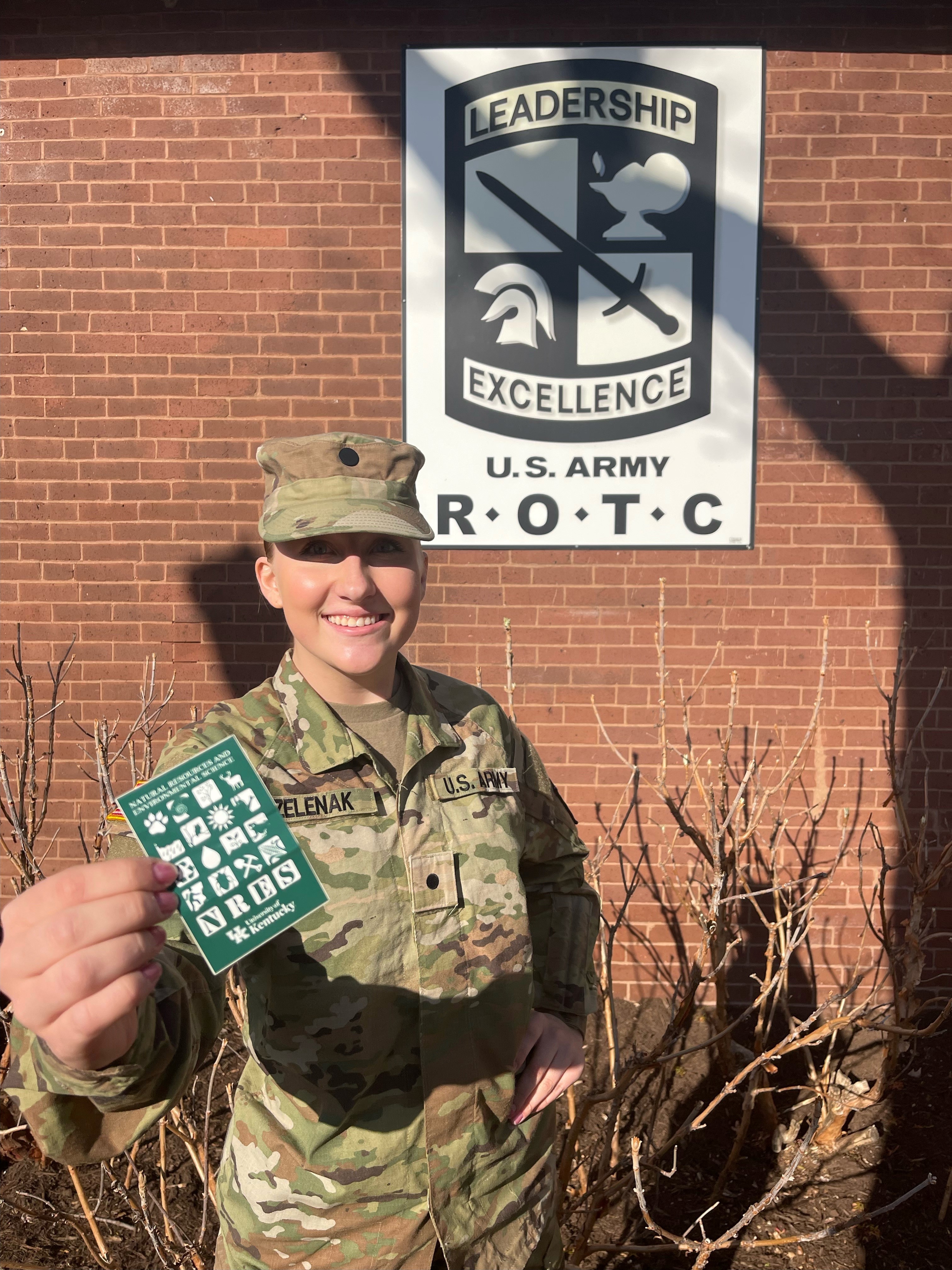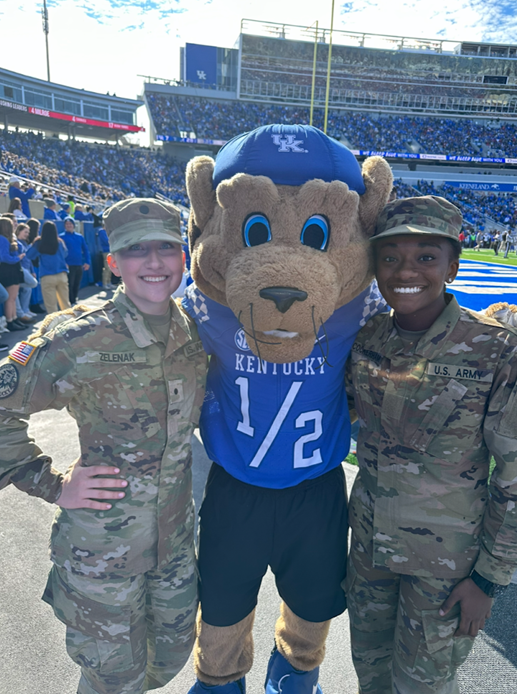From Army green to nature’s greenery, one UK student wants to improve the military’s carbon footprint
From Army green to nature’s greenery, one UK student wants to improve the military’s carbon footprint


Amid the lively bustle of the University of Kentucky, Peyton Zelenak stands as a figure of ambition and dedication. Since beginning at the UK Martin-Gatton College of Agriculture, Food, and Environment this past year, the Grove City, Ohio, native had a clear goal from the start — to integrate sustainability practices into the U.S. military, focusing on reducing pollution.
Zelenak’s natural resources and environmental science major goes beyond the classroom; it forms the foundation for her future leadership in promoting environmental conservation within the military. She is not just another student navigating the Martin-Gatton CAFE classrooms. She’s also a cadet in the UK Army ROTC, harboring aspirations of serving in the National Guard after graduation.

Her military dreams resonate from her mother, an airborne and air assault soldier, who planted the seeds in her daughter from an early age. Zelenak hopes to one day follow in her bootsteps.
"My mom was in the Army for 10 years and really loved it,” Zelenak said. “She's such an inspiration to me and really pushes me to do my best. I really hope to be like her. I think the UK ROTC and Martin-Gatton CAFE create a great step in that direction."
While she dreams of joining the armed forces, Zelenak’s goal diverges from the usual military narrative. She aims to merge her career in the military with her fervor for preserving nature, embodying an innovative spirit and deep-seated concern for our planet.
Her choice to commission as an Army officer is a concrete step towards tackling environmental degradation—a problem of immense global significance. Armed with her specialization in natural resources and environmental science, Zelenak is well-prepared to address these challenges, especially within the context of the military, traditionally known for its significant environmental footprint.
A Vision for a Sustainable Military
Zelenak is aware of the military's hefty role in pollution. According to the Department of Defense, the military emitted 51 million metric tons of carbon dioxide equivalent in fiscal year 2021.
The Army is currently working on reducing its reliance on fuels such as JP-8. The branch intends to achieve net-zero carbon emissions by 2050, a 50% reduction in net greenhouse gas pollution by 2030 compared to 2005 levels and ensure all operational and strategic exercises and simulations consider climate change risks and threats.
Zelenak hopes to push this even further. Her aim is to keep folding sustainable practices into military operations, with a keen focus on resource management and the protection of waterways. Her realistic, yet hopeful, perspective drives her ambition to forge a more sustainable military future.

"I really like the environment and just being outside; that's probably the biggest reason why I chose my degree and joined the Army,” Zelenak said. “I don't want to see nature go to waste. I believe my studies in environmental science can bring a fresh perspective to military practices. There's a lot we can do to minimize our environmental footprint, and I want to be at the forefront of that effort within the National Guard."
One former UK professor thinks Zelenak has the drive to make these dreams a reality:
“Peyton is a phenomenal young lady,” said former Martin-Gatton associate dean for diversity, equity and inclusion Mia Farrell, one of Zelenak’s instructors. “She was one of the most attentive students I had. Peyton is a hard worker, holds herself accountable and is very punctual. She always has a positive attitude and, what I think is most important, she identified opportunities through the content she was learning in the course. Peyton is a stellar student with a bright future ahead of her.”
Zelenak’s environmental advocacy doesn’t stop at her impending military service. Her academic path immerses her in the world of environmental science, offering a wide view of the field's challenges and opportunities. She’s committed to broadening her knowledge and expertise across various environmental sectors, from waterway conservation to urban forestry.
This summer, Zelenak will start an internship in urban forestry in her hometown where she will apply her academic knowledge to practical situations. This stint is poised to deepen her understanding of environmental science and arm her with the skills needed to promote and enact sustainable practices in any setting.
Life Beyond Academia and Military Aspirations
Peyton Zelenak's story goes beyond a young environmentalist's dreams; it represents the potential for significant change, fueled by the commitment and creativity of a new generation. It’s about charting new courses in traditional spheres, inspired by a passion aligned with purpose, heralding a shift toward greener practices across all walks of life.
"My aim is to bridge my environmental knowledge with practical solutions that can be implemented not only in military operations, but also civilian contexts,” Zelenak commented. “It’s about creating a sustainable future."
###
The Martin-Gatton College of Agriculture, Food and Environment is an Equal Opportunity Organization with respect to education and employment and authorization to provide research, education information and other services only to individuals and institutions that function without regard to economic or social status and will not discriminate on the basis of race, color, ethnic origin, national origin, creed, religion, political belief, sex, sexual orientation, gender identity, gender expression, pregnancy, marital status, genetic information, age, veteran status, physical or mental disability or reprisal or retaliation for prior civil rights activity.
Making the best military officers in the world; motivating young people to be better citizens. The Army Reserve Officers' Training Corps (ROTC), as it exists today, began with President Wilson signing the National Defense Act of 1916. Although military training had been taking place in civilian colleges and universities as early as 1819, the signing of the National Defense Act brought this training under single, federally-controlled entity: The Reserve Officers' Training Corps. Army ROTC is the largest officer-producing organization with the American military, having commissioned more than half a million second lieutenants since its inception.
Both Martin-Gatton CAFE and ROTC are University of Kentucky land grant institutions.
Forestry & Natural Resources Students


